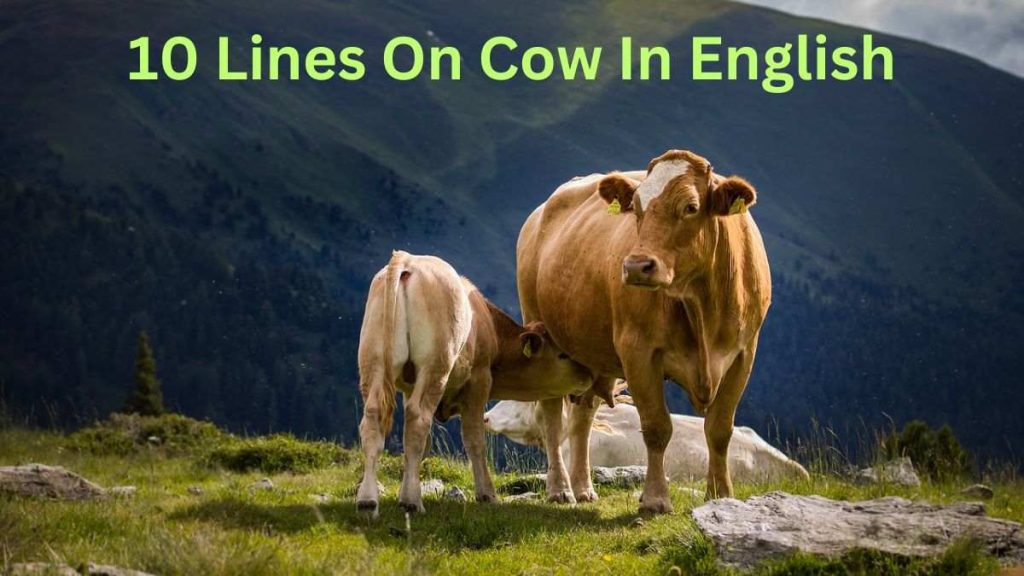Introduction
10 Lines on Cow In English: Cows are one of the most important and revered animals in various cultures around the world. They play a significant role in agriculture, provide milk and dairy products, and hold religious and cultural significance. This article aims to explore the various aspects of cows, including their importance, religious significance, different breeds, and environmental impact.

10 Lines on Cow In English
- Cow is a domestic animal.
- It is a gentle animal.
- It has two ears, one tail, two horns and four legs.
- It can be black, brown, or white.
- It gives us milk and co-dung.
- Cow milk is very healthy.
- They eat grass and vegetables.
- The offspring of a cow is called as “Calf”.
- It holds religious values in India.
- The cow is very useful to us.
Importance of Cows
Cows hold immense importance in various aspects of human life. They are often referred to as “holy cows” due to their sacred status in several religions. Additionally, cows are valuable for their contributions to agriculture, as they provide labor for farming activities and manure for fertilization.
Cows in Different Cultures
Cows hold a special place in many cultures. In Hinduism, cows are considered sacred and worshipped as a motherly figure. They are believed to embody qualities of nurturing, abundance, and purity. Similarly, in Buddhism, cows symbolize gentleness and compassion.
Cow’s Role in Agriculture
Cows play a vital role in agriculture. They are used for plowing fields, pulling carts, and transporting goods. Additionally, cow manure is an excellent source of organic fertilizer, promoting soil health and crop growth.
Cow’s Milk and Dairy Products
One of the primary benefits of cows is the production of milk and dairy products. Cow’s milk is highly nutritious and serves as a staple in many diets worldwide. It is used to produce a wide range of dairy products such as butter, cheese, yogurt, and ice cream.
Sacred Cows and Religious Significance
Cows hold immense religious significance in several faiths. In Hinduism, cows are revered as sacred animals and are associated with deities like Lord Krishna and Goddess Kamadhenu. They are protected and cared for in shelters known as “gaushalas.”
Cows in Hinduism
Hindu scriptures describe cows as symbols of abundance, purity, and fertility. They are considered the embodiment of the divine and are believed to bring prosperity and spiritual purity to the devotees. Cow’s milk and its by-products are often used in religious ceremonies and rituals.
Cows in Buddhism
In Buddhism, cows symbolize gentleness, patience, and compassion. They are associated with the qualities of the Bodhisattva, who strives for the enlightenment and liberation of all sentient beings. Cows are often depicted in Buddhist art and are respected for their calm nature.
Cow Breeds
There are various cow breeds worldwide, each with its unique characteristics and uses. Some popular cow breeds include Holstein, Jersey, Angus, and Brahman. These breeds differ in terms of milk production, meat quality, adaptability to different climates, and other factors.
Characteristics and Uses
Different cow breeds have specific characteristics and uses. For example, Holstein cows are known for their high milk production, while Angus cows are prized for their quality beef. Brahman cows are well-adapted to tropical climates and are often used in crossbreeding programs to improve other breeds.
Environmental Impact
Cows have both positive and negative environmental impacts. On one hand, they contribute to the environment by grazing on grasslands, which helps maintain biodiversity and prevents the growth of invasive plants. On the other hand, cow-related activities, such as methane emissions and deforestation for grazing land, contribute to greenhouse gas emissions and habitat destruction.
Cow’s Contribution to the Environment
Cows play a crucial role in sustainable agriculture by providing natural fertilizers through their manure. This helps reduce the reliance on chemical fertilizers and promotes soil fertility. Additionally, cow dung can be used for biogas production, offering a renewable energy source.
Cow-related Environmental Issues
The increasing demand for beef and dairy products has led to intensified farming practices, resulting in environmental issues such as deforestation, water pollution, and greenhouse gas emissions. Sustainable farming methods and reducing meat consumption can help mitigate these challenges.
Conclusion
Cows hold immense cultural, religious, and agricultural significance. They provide nourishment through milk and dairy products, contribute to sustainable agriculture, and are revered in various religions. However, it is essential to balance their importance with environmental considerations to ensure a sustainable future.
Also Read :
- Essay On Global Warming In English for Students and Children
- Essay on Holi For Students
- 10 Lines On Holi In English For Students and Children
- Essay on Ram Navami in English for Students
- 10 Lines On Dog In English For Students And Children
- 10 Lines On Cat In English For Students And Children
- 10 Lines On Elephant In English For Students And Children
- How To Write Essay On Camel For Students Of Classes 1, 2 & 3
- How To Write 10 Lines On Horse In English For Students And Children
Follow Lyrics Best on Facebook and Twitter
FAQs
Q: Are cows worshipped in all religions?
A: No, cows are primarily worshipped in Hinduism and hold religious significance in Buddhism as well.
Q: Can cows adapt to different climates?
A: Yes, certain cow breeds are well-adapted to specific climates, allowing them to thrive in diverse environments.
Q: What are some popular cow breeds known for milk production?
A: Holstein and Jersey cows are renowned for their high milk production.
Q: How do cows contribute to sustainable agriculture?
A: Cows provide natural fertilizers through their manure, reducing the reliance on chemical fertilizers and promoting soil fertility.
Q: What are the environmental issues associated with cow farming?
A: Intensified farming practices can lead to deforestation, water pollution, and greenhouse gas emissions, posing environmental challenges.